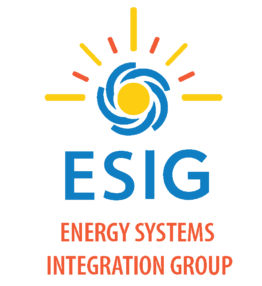
- This event has passed.
G-PST/ESIG Webinar Series: Is “Grid Forming” Enough: What Do Electricity Grids Need From IBR?
May 12, 2021 @ 4:00 pm - 5:00 pm EDT

Is “Grid Forming” Enough: What Do Electricity Grids Need From IBR?
Wednesday, May 12 – 4:00 – 5:00 p.m. (eastern US)
Featured Speaker: Tim Green, Professor, Co-Director of the Energy Futures Laboratory (EFL), Imperial College London
 Tim C Green received a B.Sc.(Eng) from Imperial College London, UK in 1986 and a Ph.D. from Heriot-Watt University, Edinburgh, UK in 1990. He is a Professor of Electrical Power Engineering at Imperial College London, and Co-Director of the Energy Futures Lab with a role of fostering interdisciplinary energy research across the university. His research uses the flexibility of power electronics to enable electricity networks to operate with very high fractions of low carbon technologies. In HVDC, he has contributed converter designs that strike improved trade-offs between power losses, physical size and fault handling. In distribution systems, he has pioneered the use of soft open points. He has made important contribution to the study of stability of grid-connected inverters. Prof. Green is a Chartered Engineering in the UK, a Fellow of the Royal Academy of Engineering and a Fellow of IEEE.
Tim C Green received a B.Sc.(Eng) from Imperial College London, UK in 1986 and a Ph.D. from Heriot-Watt University, Edinburgh, UK in 1990. He is a Professor of Electrical Power Engineering at Imperial College London, and Co-Director of the Energy Futures Lab with a role of fostering interdisciplinary energy research across the university. His research uses the flexibility of power electronics to enable electricity networks to operate with very high fractions of low carbon technologies. In HVDC, he has contributed converter designs that strike improved trade-offs between power losses, physical size and fault handling. In distribution systems, he has pioneered the use of soft open points. He has made important contribution to the study of stability of grid-connected inverters. Prof. Green is a Chartered Engineering in the UK, a Fellow of the Royal Academy of Engineering and a Fellow of IEEE.
Moderator: Charlie Smith, Executive Director, ESIG
Registration Cost: FREE
Q&A Session: We will be using the slido platform for Q&A. Please submit your questions and follow-along during the event at this link.
Webinar Abstract: The replacement of electro-mechanical machines by inverter-based resources (IBR) is fundamentally changing the dynamics and stability properties of grids. A review will be made of the needs a grid system has in order that it is stable and secure. The needs in terms of voltage strength, frequency regulation and synchronisation will be discussed in term of how they are met by synchronous machines, grid-following converters and grid-forming converters. A case will be made that there is advantage in not all resources being obliged to provide all system services and that new services can replace some traditional services. Thus, strictly following a virtual synchronous machine (VSM) approach may not yield the best solution.
Approaches to ensuring system-wide dynamic stability will also be explored noting that IBR have overlapping sets of dynamics but with details often hidden in black-box models. A method for identifying root-causes of poorly damped modes in black-box models will be illustrated. This analytical grey-box method avoids exhaustive transient simulation. A toolbox for compiling models of composite grids with IBR and synchronous machines will be introduced. The talk will conclude with some thoughts on modelling and analysis challenges that remain for IBR dominated grids.
About G-PST Consortium
The chief executive officers of National Grid Electricity System Operator UK, California Independent System Operator (CAISO), Australia Energy Market Operator (AEMO), Ireland’s System Operator (EirGrid), and Denmark’s System Operator (Energinet) are champions in developing the consortium mission and activities. Importantly, these system operators are leading a Research Agenda Group to identify common, cutting-edge research questions that can inform large- scale national research and development investments. Relevant results and lessons from this process will be broadly shared for learning across all countries. The Consortium is also partnering with around 10 emerging economy and developing country system operators from Africa, Asia, Latin America and Eastern Europe who will also guide the G-PST vision and collaborate with the Consortium to advance power system transformation with a focus on technical collaboration, peer learning and exchange, and workforce development to support local PST priorities.
A core team, including the Energy Systems Integration Group (ESIG), Imperial College London, Council of Scientific and Industrial Research (CSIR), Fraunhofer Cluster of Excellence for Integrated Energy Systems, National Renewable Energy Laboratory, Latin American Energy Organization (OLADE), IEEE, Electric Power Research Institute (EPRI), Commonwealth Scientific and Industrial Research Organization (CSIRO), the Danish Technical University (DTU), and ASEAN Center for Energy, is actively developing the consortium and will be engaged in implementation of technical work as well as coordinating specific pillars.
International agencies and multilateral and regional development banks, including World Bank, United States Agency for International Development (USAID), German Agency for International Cooperation (GIZ), International Energy Agency (IEA), Asian Development Bank (ADB), European Bank for Reconstruction and Development (EBRD) and others are serving as key implementing partners to ensure the consortium complements and reinforces existing programs.
For more information on the G-PST visit https://globalpst.org/.

